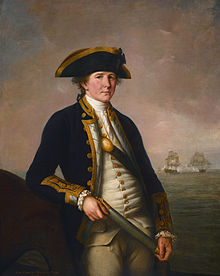Sir Charles Pole, 1st Baronet
| Sir Charles Pole, Bt, GCB | |
|---|---|

Charles Morice Pole (John Francis Rigaud, 1781)
|
|
| Born | 18 January 1757 |
| Died | 6 September 1830 (aged 73) Aldenham Abbey, Hertfordshire |
| Allegiance |
|
| Service/branch |
|
| Years of service | 1770–1806 |
| Rank | Admiral of the Fleet |
| Commands held |
HMS Cormorant HMS Britannia HMS Hussar HMS Success HMS Crown HMS Melampus HMS Illustrious HMS Colossus Baltic Fleet |
| Battles/wars |
American Revolutionary War French Revolutionary Wars Napoleonic Wars |
| Awards | Knight Grand Cross of the Order of the Bath |
Admiral of the Fleet Sir Charles Morice Pole, 1st Baronet GCB (18 January 1757 – 6 September 1830) was a Royal Navy officer and colonial governor. As a junior officer he saw action at the Siege of Pondicherry in India during the American Revolutionary War. After taking command of the fifth-rate HMS Success he captured and then destroyed the Spanish frigate Santa Catalina in the Strait of Gibraltar in the action of 16 March 1782 later in that War.
After capturing the French privateer Vanneau in June 1793, Pole took part in the Siege of Toulon at an early stage of the French Revolutionary Wars. He went on to be governor and commander-in-chief of Newfoundland and then commanded the Baltic Fleet later in the War. He also served as a Lord Commissioner of the Admiralty on the Admiralty Board led by Viscount Howick during the Napoleonic Wars.
Born the second son of Reginald Pole and Anne Pole (née Buller), Pole was educated at Plympton Grammar School before joining the Royal Naval Academy at Portsmouth in January 1770. He was appointed to the fifth-rate HMS Thames in 1772 and then transferred to the fourth-rate HMS Salisbury on the East Indies Station in December 1773. Promoted to lieutenant on 26 June 1777, he was assigned to the sixth-rate HMS Seahorse and then transferred to the fourth-rate HMS Rippon in 1778 and saw action at the Siege of Pondicherry in India in October 1778 during the American Revolutionary War. He then became commanding officer of the sloop HMS Cormorant and was sent home with the despatches.
...
Wikipedia
